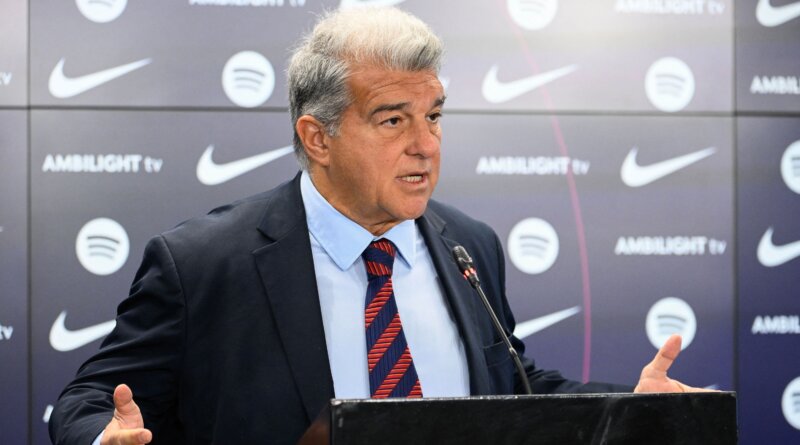Barcelona Debt Crisis: Bayern Chief Slams Financial Chaos
Barcelona debt crisis continues to dominate football headlines, with Bayern Munich’s honorary president Uli Hoeness sharply criticizing the Catalan giants for their staggering financial mismanagement. According to Hoeness, Barcelona’s ballooning debt – now at a jaw-dropping €1.45 billion – is “absurd and incomprehensible,” raising questions about how the club is still permitted to compete in La Liga.
Barcelona Debt Crisis: How Did It Get So Bad?
The Barcelona debt crisis has deep roots, reaching back to the latter years under former president Josep Maria Bartomeu. Following the record €222 million sale of Neymar to Paris Saint-Germain in 2017, Barcelona embarked on a reckless spending spree instead of consolidating their finances. The club shelled out nearly €960 million in transfers over three years, resulting in a net spend of €399 million.
Wage bills and amortization costs soared to €593.9 million, consuming a massive 81% of club revenue in the 2017-18 season. The situation was exacerbated by Lionel Messi’s eye-watering contract, valued at up to €555.2 million over four years, and the sudden collapse of matchday revenue during the COVID-19 pandemic, which dropped from €174.9 million to just €23.7 million.
Financial Levers, Asset Sales, and Mounting Liabilities
To stave off disaster, president Joan Laporta implemented a series of drastic measures, activating “financial levers” such as selling 25% of La Liga TV rights for €667.5 million and offloading 49% of Barca Studios for €200 million, although only €20 million of that has materialized to date. Additionally, the Espai Barca stadium redevelopment project ballooned from an initial €600 million budget to a projected €1.5 billion, with €975 million already spent.
Barcelona’s borrowing spree included €595 million from Goldman Sachs (with €30 million annual repayments), a €265.7 million bullet payment due in 2031-32, and €907.7 million linked to the ongoing stadium project. This has cemented Barcelona’s unenviable status as the most indebted club in football.
Outstanding Debts to Other Clubs
Barcelona’s most recent financial report highlights that the club still owes €159.1 million to other teams. Leeds United leads the list with €41.9 million outstanding for Raphinha, followed by €20 million to Bayern Munich for Robert Lewandowski and €24.5 million to Sevilla for Jules Kounde. Manchester City is still awaiting €13.3 million for Ferran Torres, while Real Betis is owed €8 million for Emerson Royal. Several other payments remain due to clubs such as Girona, Valencia, Sporting CP, and Rennes.
Bayern Munich’s Uli Hoeness Condemns Barcelona Debt Crisis
On the OMR Podcast, Uli Hoeness didn’t hold back in his assessment of the Barcelona debt crisis. “Barcelona isn’t a model I would ever respect. In any other country, they would have been relegated. How can you function with €1.3 billion in debt? It’s a miracle they’re still playing in the first division,” he stated. Hoeness contrasted Barcelona’s turmoil with Bayern’s fiscally conservative approach, emphasizing the strict financial controls and regular audits enforced in the Bundesliga. He suggested that such oversight would have halted Barcelona’s excesses long ago.
The Cost of Ambition: Espai Barca and Sporting Aspirations
The Espai Barca redevelopment project, intended to rejuvenate the club and increase future revenue, has instead become a symbol of the Barcelona debt crisis. As costs soar and revenue dips due to the temporary move to Estadi Olimpic Lluis Companys, the club’s financial outlook remains precarious. While Laporta’s “levers” have offered temporary relief, the sustainability of such measures is increasingly questioned by experts and rival executives alike.
On the Pitch: A Silver Lining Amid Financial Turmoil
Despite the Barcelona debt crisis, the team has shown renewed vigor under coach Hansi Flick. Even with key players like Pedri and Gavi sidelined due to injuries, the defending La Liga champions have managed to cut Real Madrid’s lead at the top of the table to just one point. Recent results include spirited performances in both domestic and European competitions, with the upcoming Champions League clash against Chelsea promising to be a test of their resilience.
What’s Next for Barcelona?
As Barcelona prepares for crucial fixtures and continues to grapple with their financial crisis, the football world watches closely. The ongoing saga raises important questions about the governance and sustainability of top clubs in modern football. For more updates on the Barcelona debt crisis and the latest football news, visit for more news.
Opinion: Time for Reform and Transparency
The Barcelona debt crisis is a cautionary tale for football clubs everywhere. While sporting ambition is essential, it should not come at the expense of sound financial management. Clubs must balance on-field success with off-field responsibility, ensuring their legacy is built on stability, not short-term gambles. The footballing authorities may need to consider stricter regulations to prevent similar crises in the future.
Your global gateway to nonstop football coverage:
News Goal
Share this content:
